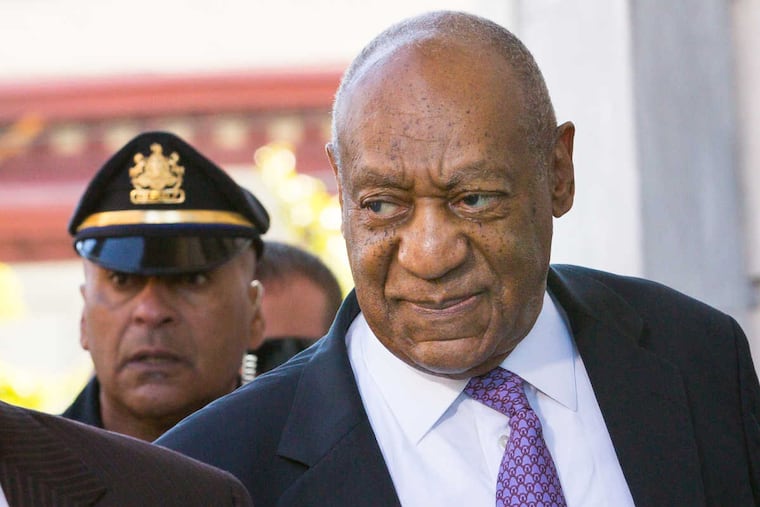Ending with Cosby's own words, prosecution rests
Cosby's lawyers are set to begin presenting their defense Monday after a whirlwind government case highlighted by Constand's first public statements about the alleged attack and Cosby's own potentially damaging words.

Prosecutors in Bill Cosby's sex-assault trial closed their case Friday with one last punch: the 79-year-old entertainer's own admission that in years past, he got powerful sedatives to give to women with whom he hoped to have sexual encounters.
In a 2005 deposition, Cosby admitted obtaining seven prescriptions for Quaaludes, a disco-era party drug, from a Hollywood gynecologist in the '70s. But he insisted that he had never given anyone pills without their knowledge and consent.
"Quaaludes happen to be the drug that … young people were using to party with, and I wanted to have them just in case," Cosby said then.
The excerpts read to jurors Friday were part of a prosecution bid to leave a lasting impression on the panel of seven men and five women as they absorbed a week's worth of testimony and evidence. At its base, their task is to decide if they believe Andrea Constand's accusation that the entertainer gave her pills one night in 2004 that left her essentially powerless, then sexually assaulted her.
Cosby's lawyers are set to begin presenting evidence Monday after a whirlwind government case highlighted by Constand's first public statements about the alleged attack and Cosby's own potentially damaging words — picked from a deposition he gave for a lawsuit she filed against him in 2005.
The suit later settled for an undisclosed sum and an agreement that barred both parties from discussing the incident. But the unsealing of that deposition by a federal judge in 2015 spurred Montgomery County District Attorney Kevin R. Steele to reopen the investigation that year.
Because Cosby had said he did not intend to testify in his own defense, the deposition was poised to be the only chance for jurors to hear directly from the defendant. But Cosby spokesman Andrew Wyatt hinted Friday that his boss might be changing his mind.
"Nothing is ever off the table in a trial of this magnitude," Wyatt told reporters during a break in the proceedings in Norristown.
As Cosby walked from the courtroom at the end of the day, a woman yelled: "Bill Cosby, I love you!" He raised his walking stick in acknowledgment.
As he had a day earlier, the entertainer had sat stone-faced as Montgomery County detective James Reape read back his own words to an eagerly listening jury.
One moment in that decade-old testimony elicited a chuckle from jurors and a rare courtroom smile from the defendant – a question and answer about the now-deceased doctor who wrote the Quaaludes prescription, knowing full well Cosby didn't intend to take the pills himself.
"Where does he practice?" Cosby had been asked, according to the transcript.
Cosby replied: "Dead."
The final government witness, toxicologist Timothy Rohrig, said the drowsiness and sedation Constand described in her testimony after accepting three blue pills from Cosby in 2004 could have been caused by a drug similar to Quaaludes — or by Benadryl, the over-the-counter allergy medicine Cosby has maintained he gave to Constand that night.
Either way, Constand claimed the pills left her powerless as Cosby molested her on the couch at his Cheltenham home.
Friday's deposition excerpts also included one in which Cosby expressed concern over being perceived as a "dirty old man" after Constand's mother called to confront him in 2005.
"I apologized to this woman," he said in the deposition, read aloud in court by the detective. "But my apology was, my God, I'm in trouble with these people because this is an old man and their young daughter."
At the time of the incident, Constand was 31, Cosby 66.
His deposition also showed he worried that his career could take a financial hit if Constand's allegations became public. He was unaware at the time that Constand had gone to police with her sexual assault allegations just days before the recorded conversation.
In earlier testimony Friday, prosecutors had hoped to beat back questions about why Constand had taken a year to report the alleged attack to authorities.
Veronique Valliere, a counselor qualified as an expert on the behavior of sex-assault victims, told jurors that delays in reporting attacks are not unusual. She testified it can take years for victims to work out their feelings about what happened to them and accept the scrutiny of coming forward.
"Most [assaults] are never reported to authorities, so they're delayed forever," she said.
But defense lawyer Brian J. McMonagle challenged Valliere on two fronts – a 2016 Facebook post in which she appeared to cheer on prosecutors' case against Cosby, and her testimony Friday, which he said veered too close to her giving an opinion directly on Cosby's guilt or innocence.
"She is now telling this jury that this defendant is guilty," McMonagle argued to Judge Steven T. O'Neill when the jury was out of the room, seeking a mistrial.
O'Neill ruled the testimony permissible and rejected the request.
Charged with three counts of aggravated indecent assault, Cosby could face more than a decade in prison if convicted. His defense has remained mum on what witnesses, if any, it may call Monday.
Keep up with every development in Bill Cosby's case with our day-by-day recaps and explainer on everything you need to know about the case and its major players.